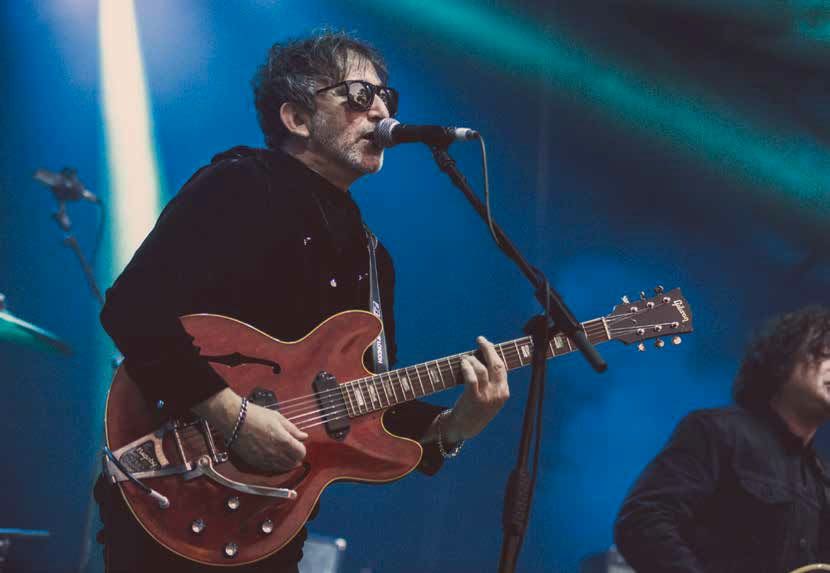Originally emerging on the scene back in the late 80s, Lightning Seeds was something of an imaginary band created by just Ian Broudie in his spare room, until gaining some well-deserved attention – and a few members – taking the band to global success. 30 years on, ahead of the band’s summer performances, we spoke to frontman Ian Broudie to discuss the origins and future of the band as well as the importance of music and its evolution.
You’re on the Fi.Fest bill this summer, do you like playing at festivals?
I do like it and it’s what the British like doing isn’t it? Going to these events over the weekends. If it’s a sunny day it really helps. I think going to Glastonbury or going somewhere local and seeing bands is really cool and it’s culturally quite a nice thing to do.
Lightning Seeds was initially a solo project, why did you make the move to extend it into a band?
It was never intended to be a solo project, but the first album was made up of homemade recordings if you like. I didn’t have a record contract or anything. I was just recording my songs and then someone heard them and said, “I haven’t really got a record label, but I’d love to put some of these out there.” So, the press took 500 copies of my song ‘Pure’ and over the months it gathered momentum. They put it out through Rough Trade and then it got on radio. It was very slow, but it gradually grew into something that was a hit in America and a hit here, but all the while there was still no group, it was just me. When I came to the third album, I decided it would be great to play it live. Rather than being a solo artist I called the band Lightning Seeds in the hope that it would develop into something. It has pretty much always stayed myself making the records so it’s a strange hybrid between a band and – I wouldn’t say solo – I don’t know what you’d call it. These days – which is a long time on – I have a great band playing with me and everyone’s been involved for a long time so I’m enjoying it more now than I ever have.
Tell us about your son touring with you and playing for the band.
To a degree I stopped playing for a few years and the reason I started again was that my son and I used to play acoustic guitar together a lot. Just for fun we did a few acoustic gigs together and gradually that grew into playing more tunes as a band, and I decided to make a new album. It’s actually the 25th anniversary of our album Jollification so we’re playing a few gigs to celebrate that and then afterwards the plan is to have a new record out which will be the first one in earnest since about 2000.
Having been on the music scene for that long, how have you seen it change?
When you had Elvis, Bob Dylan and the Beatles, it didn’t change too much for about 40 years and I suppose the thing that’s really changed it more than any musical movement is the internet and the way people now listen to music. The 90s was the last decade of the album and if I’m listening to things, I tend to have a list of songs that I want to add and very rarely listen to a whole album. It’s almost like everyone’s got their own greatest hits coming out of their heads. Everyone’s so used to having music for free that it makes it mean a bit less to people in a way. It’s changed at the listener’s end of things and it’s also changed very much at my end because the internet enables you to get in touch with people who like you. The fact that you can speak to people has changed everything, perhaps just as much as streaming. Music is a funny thing; it is an art form but it’s also a business art controlled by the media ad business, so it’s not really like being a painter. If you’re Banksy and people like your paintings, then you just do it again and again and everyone buys it and it’s not a problem. You don’t expect Andy Warhol to just stop doing pop-art and try his hand at Botticelli. Music is slightly different in that respect; it has to move and evolve and it’s very emotive. In a way it’s the most important thing in the world. When you’re very happy it’s music that really expresses that and makes you feel better, when you’re sad you want to be at home and hear music that’ll make you feel a little bit sadder, if you go for a night out you want to hear music, if you’re at a wedding you want to hear music, all of the emotional peaks of your life have a soundtrack.
Have you always wanted to go into music?
Times have changed a little bit and whereas now there are a lot of people who make music as a career choice, in the past it was more of a vocational choice. There was nothing else that I could do and from the age of about seven or eight it’s all I ever imagined doing so there was never really a conscious choice made. Music was always a hobby; from my mates meeting in a garage and making a racket at about 13, to going to gigs when I got older and wanting to play gigs when I got older still – there was never a moment, it was a path.
You did quite a lot of work in record producing, what was the reason for going into that?
I was very reluctant to do it but there was a group called Echo and the Bunnymen who were my pals and it was them who wanted me to produce some of their records. I was very reticent to do it because while I think I’m good at helping other people to make their music, what I want to be doing is making my own. I decided to do it under the pseudonym Kingbird so that it would be a separate… it wouldn’t be me. I learnt a lot from doing both things and it was a great opportunity to see how other people got things done so it did really help me. Over the years I’ve ping-ponged between the two. In around 2000 when I felt that the Lightning Seeds had run its course for that chapter, I went back to Liverpool and producing then seemed the most natural thing to do. I started working with a couple of unsigned bands and gradually those unsigned bands became signed and we made albums – that was really good fun but I got a bit bored with that and now I’m putting my energy back into the Lightning Seeds and we’ve been playing live for the last few years.
Your song ‘Three Lions’ has remained relevant for so long after its release, why do you think that is?
In the last World Cup two years ago, it was number one again; it naturally happened without us having to re-release it. The gift of social media meant it reached a new audience of people who weren’t very aware when it was out the first time because they were so young, and it stayed relevant because we still haven’t won it. Football songs have always been a bit triumphant and like, ‘ENGLAND!’ and I never really liked that. I don’t really like that kind of jingoism either so when we decided we were going to do it, we tried to write a song that was more about being a fan than a player. As a fan, most of the time you’re dealing with losing (especially as an England fan). Whoever you support there’s a lot of disappointment involved, and I think it was a song which connected with people for that reason because that’s kind of what it’s about, so I think it’s stays relevant because of that.
What’s in the pipeline for you?
We’re halfway through these lovely gigs for Jollification which have been really brilliant. Although they’ve got a nostalgic feel to them, it’s important to me that it doesn’t just become nostalgic and to keep being creative. We’ve got some events in the summer and at the same time, we’re finishing off the album and doing some more gigs; still playing our old songs but including the new album as well. There are loads of people who I’d like to work with, but I don’t really think we could add anything to them. It has to be a dual thing of really liking them and also thinking you could add something and make them stronger. I was thinking I’d like to do this album and then the next one I’d like to do loads of collaborations, but I don’t know who yet. We’ll see where the wind takes us really.








